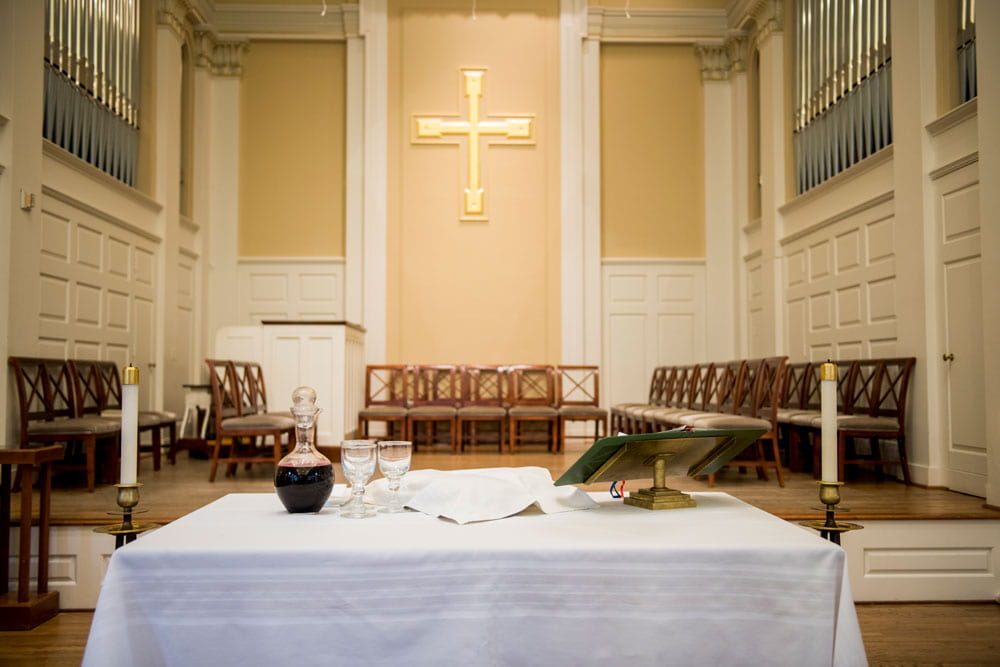“This is not how we expected today to go,” said Madison Garcia, “yet here we are.”
With those words, Garcia opened the Perkins Graduate Worship Service, held May 15 via Zoom, with Prof. Alyce McKenzie preaching. Nearly 100 students, faculty, family and friends were in attendance for the virtual worship service.
The program was organized by members of the Senior Class worship committee, which included Kathy Hines, Joyce Vanderlip, Sumesh Jacob, Cheryl Roseborough, Nick McRae, Ellen Chimowa, Macie Liptoi and Kristina Roth-Klinck.
Chris Anderson led the opening hymn, “The Summons,” followed by the Call to Worship by Nick McRae. Sumesh Jacob offered an opening prayer, saying, “Bless all who have answered your call and are now graduating into your sacred service,” followed by a spoken hymn, “A Charge to Keep I Have,” led by Kathy Hines.
McKenzie’s sermon, “Somebody’s Calling,” was based on Proverbs 8:1-11 (The Call of Wisdom) and Matthew 16:13-28 (Peter’s declaration of Jesus as Messiah and Jesus’ saying about losing one’s life to find it). It was inspired by an interview she did a few weeks before with Robin Lovin, Cary M. Maguire University Professor of Ethics Emeritus at SMU, as part of the Perkins Center for Preaching Excellence at SMU’s video series, “What’s a Preacher to Do?” pcpe.smu.edu/COVID-19Resources
She encouraged graduates to think deeply about the meaning of calling. She shared the story of a new Perkins student, who dismissed his previous career as a music teacher and band director as insignificant and unimportant. By contrast, she talked about Jerry, a cashier who works in her local grocery store. After she thanked him for coming to work in the midst of the pandemic, Jerry replied, “I have always known that I am an essential worker. And now the whole world knows!”
Jerry had it right, McKenzie said.
“All Christians have a vocation or calling … not just clergy or monastics,” she said. “A job done in service of God and others can be an important source of meaning in our lives.”
Recent attention to frontline workers – from grocery cashiers to nurses working in COVID-19 wards in hospitals – leads us to reconsider notions about calling, and what’s important.
“Vocations or callings have different functions,” she said. “But they all make a contribution. Each involves a summons, makes a contribution and carries with it a cross.”
McKenzie urged graduating students to remember that as they leave Perkins.
“You are at a crossroads – just graduating,” she said. “I can picture your minds bursting with all that you’ve learned. Here you are with all this knowledge. But nobody counted on COVID-19 … Yet we can be empowered to lead even as we have a moment of existential consternation” like Peter’s when, after confessing his faith in Jesus, he was confronted with the reality that discipleship entails sacrifice.
An important calling of all Christians, she added, is to shine a light on areas where the callings of others are not honored, due to racism, homophobia and vocational elitism. This is an important part of our work toward the healing of the world.
“Your vocation is to honor the vocation of others,” she said.
The service concluded with a prayer by Jimmy Calvert, special music by Sarah Bilaye-Benibo and Prayers of the People led by Kristina Roth-Klinck. Marcell Steuernagel closed the service with a rendition of the hymn “Here I Am, Lord!”
